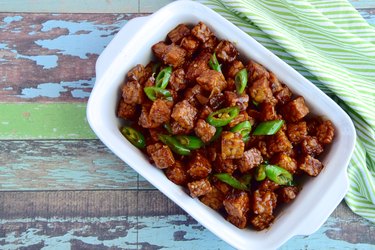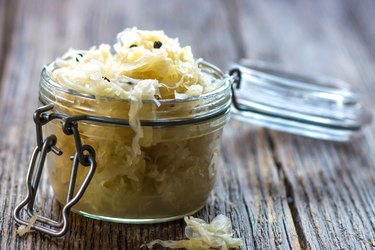
Probiotics and gut health go together like peanut butter and jelly (although, sadly, you won't find the beneficial bugs in that classic combo). But a healthy tummy may not be the only benefit to adding probiotic-rich foods to your diet — they could also help regulate your weight.
Here's the breakdown on probiotics for weight loss, plus four healthy foods to add to your shopping list.
Video of the Day
Video of the Day
Can Probiotics Help You Lose Weight?
Probiotics are live microorganisms that naturally exist in your digestive system and can be found in certain fermented foods. There are different strains of probiotics, according to the National Center for Complementary and Integrative Health, with the most common being the Lactobacillus and Bifidobacterium groups. Different strains have been connected to different health benefits.
When it comes to whether probiotics can aid with weight loss, the science isn't totally clear yet. The vast majority of research done on the effects of probiotics so far focuses on immune health and how to improve digestive conditions.
But what is clear is that a healthy gut is key to your overall health, and aiming to live a healthier lifestyle can certainly lead to weight loss. So, no, probiotics won't turn your body into a fat-burning machine. But along with healthy habits like eating well and exercising often, they can help set you on a path toward healthier digestion and an overall healthier body, making it easier to achieve your weight-loss goals.
4 Probiotic-Rich Foods for Weight Loss
These five healthy foods make delicious additions to your diet while keeping your gut bugs busy.
1. Yogurt

Yogurt — which is made by fermenting milk with lactic acid and Bifidobacteria strains — is one of the most well-known probiotic foods and has a variety of health benefits, from reducing diarrhea caused by antibiotics in children to improving blood pressure in some adults.
And, as a lean protein, yogurt makes a great addition to any weight-loss diet. Just make sure to check the nutrition label for two things: that the yogurt contains live or active cultures, and that it doesn't have a ton of added sugar.
And it may be counterintuitive, but choosing full-fat yogurt over the fat-free variety may actually help you lose more weight, according to Harvard Health Publishing. That's because the fat helps you feel full, and you're less likely to overeat when you feel satisfied.
2. Kefir
Kefir is a drinkable form of fermented milk that may be a better source of probiotics than yogurt. That's because kefir contains several strains of healthy bacteria and yeast, while yogurt only contains a bacterial strain.
Kefir is also lower in lactose than yogurt and can safely be eaten by people who are lactose intolerant, according to an October 2013 review in the Brazilian Journal of Microbiology.
Kefir and other dairy products may be especially beneficial for older women: Increasing dairy foods to four to five servings a day helped postmenopausal women lose weight in a randomized trial published May 2019 in Nutrients.
How to Eat It
3. Sauerkraut

Sauerkraut is full of probiotics and is also low in calories. In fact, one cup of sauerkraut has fewer calories (27, according to MyFoodData) than the same amount of apples, carrots or spinach.
Plus, it's a good source of fiber, which helps you feel full (and less likely to reach for seconds). In fact, a study published February 2015 in the Annals of Internal Medicine found that simply aiming to eat 30 grams of fiber each day can help you lose weight as effectively as a more complicated diet.
And according to a 2015 study published in the journal Obesity, Lactobacillus probiotics (found in this fermented cabbage) may prevent weight gain and fat accumulation.
Tip
Look for unpasteurized varieties of sauerkraut, as the process of pasteurization kills the microorganisms that provide the probiotic benefit.
4. Tempeh
Tempeh is a popular meat alternative. It's a fermented soybean product molded into the shape of a block (similar in shape to tofu).
While tofu can have a sponge-like texture, tempeh is much more firm, making it a great vegetarian substitute for meat products. And while vitamin B12 is hard to come by without a supplement (as it is mainly found in meat and fish), the fermentation process of the soybeans creates some B12.
Swapping meat for plant-based proteins like tempeh may help you lose weight. In a study of more than 9,000 people, those who stuck to a plant-based diet the most (aka ate more plants and less meat) had lower BMIs and body fat percentages and smaller waists, according to a March 2019 report in Epidemiology.
- National Center for Complementary and Integrative Health: "Probiotics: What You Need To Know"
- Nutrition Research: "Probiotics for weight loss: a systematic review and meta-analysis"
- Food Research International: "Bifidobacteria in milk products: An overview of physiological and biochemical properties, exopolysaccharide production, selection criteria of milk products and health benefits"
- BMJ: "Can probiotic yogurt prevent diarrhoea in children on antibiotics? A double-blind, randomised, placebo-controlled study"
- British Journal of Nutrition: "Effect of probiotic fermented milk on blood pressure: a meta-analysis of randomised controlled trials"
- Mayo Clinic: "Mayo Clinic Minute: What is kefir?"
- Brazilian Journal of Microbiology: "Microbiological, technological and therapeutic properties of kefir: a natural probiotic beverage"
- International Journal of food microbiology: "Formation of B-vitamins by bacteria during the soaking process of soybeans for tempe fermentation"
- Harvard Health Publishing: "Is it time to stop skimming over full-fat dairy?"
- Nutrients: "Role of Calcium and Low-Fat Dairy Foods in Weight-Loss Outcomes Revisited: Results from the Randomized Trial of Effects on Bone and Body Composition in Overweight/Obese Postmenopausal Women"
- Annals of Internal Medicine: "Single-Component Versus Multicomponent Dietary Goals for the Metabolic Syndrome"
- MyFoodData: "Sauerkraut"
- Epidemiology: "Plant-based Diet and Adiposity Over Time in a Middle-aged and Elderly Population: The Rotterdam Study"